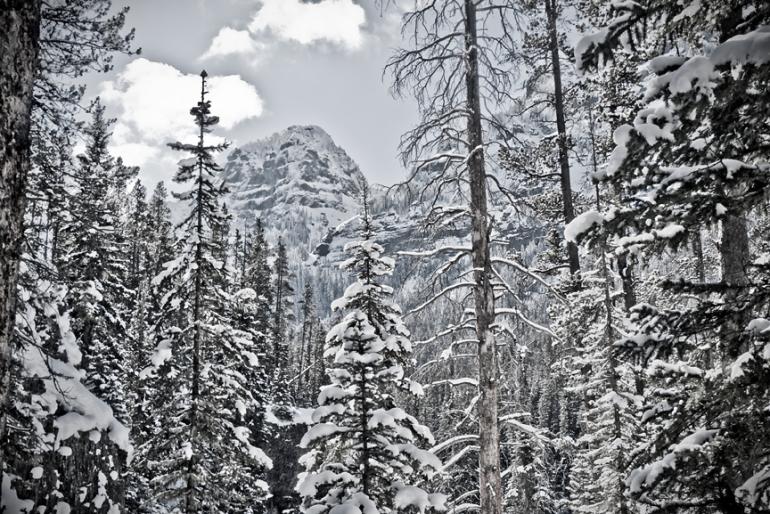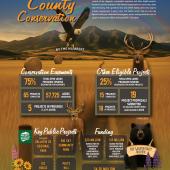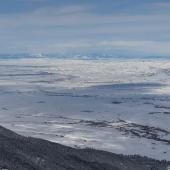Warming Trend
Winter is a fine time in Montana, not just for skiers, but for wilderness aficionados as well. Elk are in the low country, bison are often on the move, and wolves are visible against the pale palette of snow. And tracks tell stories when animals won’t. Wilderness is effectively expanded due to fewer people and more solitude on many public lands.
The only winter-like aspect of the conservation of these wonderful winter resources in Montana, however, is the frosty chill between opposing factions. Conservation, always controversial, can be particularly so here, where people live and breathe a variety of outdoor ethics. Even in winter, Montanans vent like fumaroles over their favorite area, activity, or critter.
Yet, perhaps hopefully, these modern resource controversies generally arise out of shared love of the land—not indifference as elsewhere. It’s a natural-resource version of internecine warfare.
Wolves
Wolves highlight the close quarters in which resource wars are often waged. All major stakeholders consider themselves conservationists (usually the original conservationists). And everyone speaks the same language now, talking about science, state management, and managing wolves like other wildlife. So where’s the rub? With whether and how conservation traditions, values, and laws apply to wolves.
Wolf advocates want at least the full panoply of wildlife principles applied to wolves, including assurance that wolf numbers will be kept up. States and conservation hunters want to give the old ways a chance to work for wolves like they did for deer and elk. Other hunters view wolves not as wildlife but as a threat to game herds that must be suppressed. Ranchers are less concerned with wildlife principles than keeping wolf impacts and costs to a minimum.
Believe it or not, the wolf issue may actually get sorted out this winter, through some combination of legal settlements and congressional intervention. It remains to be seen if it will be resolved in a way that respects our conservation traditions old and new, and the wolves themselves.
Wilderness
Wilderness is taking a back seat to wolves this winter. As long as Montana has had a wilderness bill, squeaky wheels get the grease—and wolf opponents are squeaking loudly. As a result, legislation removing wolves from the Endangered Species list has pole position. Any delay in Wilderness designation could spell short-term doom for wilderness advocates; however, given the antigovernment tenor of November’s elections. Historically, the Senate defers to senators from the state on wilderness and other issues, but new senators and their House colleagues may feel more bound to their antigovernment principles than hoary traditions. Senator Tester remains committed to passing his jobs and wilderness bill, but the switchbacks just got steeper.
Bison
This could be a bad winter for bison, particularly if it’s a cold snowy one that pushes them out of Yellowstone Park in search of food onto National Forest and other lands where they can be killed. The Greater Yellowstone herd has regrown to around 4,000 after 1,600 were killed in winter 2008. Four thousand is about when Montana starts killing bison to get the herd down to around 3,000, a number less likely to leave the Park. Montana refuses to accept bison as wildlife due to rancher concerns over grass, fences, and the slightest risk of disease transmission. Hunters and allies tried in past legislatures to return bison management to Montana Fish, Wildlife & Parks from the Department of Livestock, but they may have their hands full this January fending off antibison bills from an increasingly conservative state legislature. A bill that would prevent relocating even disease-free Yellowstone bison to reservations or state lands in Montana may still happen.
However, the Obama Administration shouldn’t be eager to get caught up in the slaughter of one of the most popular and iconic animals in America. Montana could kill bison without the support of the National Park Service and U.S. Forest Service, but at much more cost and difficulty. This could open the door to some less lethal solutions.
Conservation issues often simmer like a mudpot, and this winter, they’re going off like geysers. Hopefully the eruptions will relieve political pressure on the resources everyone loves without ruining them.
Mike Leahy is the former Rocky Mountain Region Director for Defenders of Wildlife.











